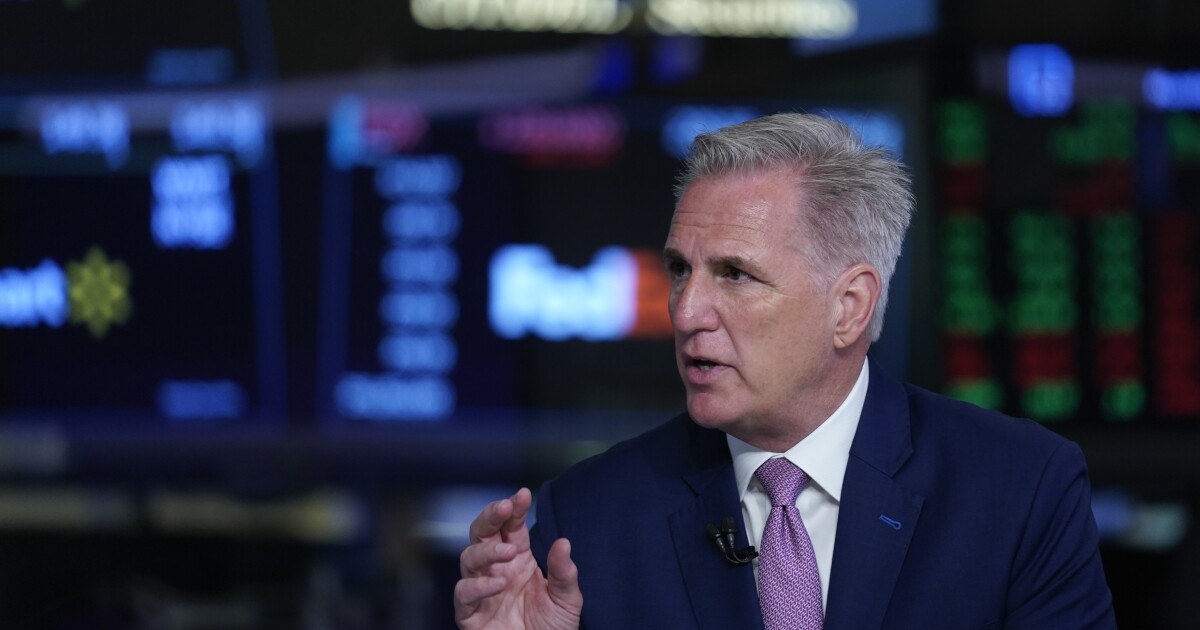

More than 100 days into the 118th Congress and with only months before the country could default, President Joe Biden and House Speaker Kevin McCarthy (R-CA) are at loggerheads over the debt ceiling and federal budget.
But McCarthy’s efforts to broker a debt ceiling deal among House Republicans could backfire with only a four-vote majority, jeopardizing negotiations with the White House, the stock market, millions of jobs, and the global financial system.
DESANTIS SUPPORTERS LEAP TO HIS DEFENSE AGAINST TRUMP AHEAD OF PRIMARY FIGHT
House Republican Study Committee Chairman Kevin Hern (R-OK) is “encouraged” by McCarthy’s outreach after the speaker spoke on the phone last weekend with his conference about the debt ceiling and then convened an in-person meeting Tuesday. The face-to-face was scheduled after McCarthy addressed Wall Street earlier this week.
“There seems to be a consensus among the conference on a number of issues, including bills we have already passed, that should be included in our debt limit legislation,” Hern told the Washington Examiner. “There’s still hard work ahead of us, but I believe we can get 218 votes by the end of next week.”
Those bills include House Republicans’ repeal of $80 billion in IRS funding, allocated through the Democrats-only Inflation Reduction Act, in addition to that measure’s climate provisions — as well as the GOP-only Lower Energy Costs Act.
“A large bloc of members really want to see IRS & IRA included in the final bill,” one source familiar said. “At conference this morning, there was wide support behind the inclusion of both IRA/IRS, and McCarthy seemed to be willing to have that discussion.”
Rep. Chip Roy (R-TX) is one of those lawmakers, contending, “under no circumstances,” should House Republicans “pass a long-term debt ceiling increase to mortgage our kids’ future without getting substantive changes.”
“We need to undo the Inflation Reduction Act, so-called, which has all these ridiculous green subsidies, which would destroy our ability to have economic growth and energy freedom,” he told conservative radio host Glenn Beck. “We need to undo the damage of the IRS proposal, which will hang these bureaucrats going after the American people, who are trying to just go through their life.”
McCarthy is seeking a vote on a debt ceiling deal before the House’s next recess from April 28. The initial agreement, tentatively whipped by Reps. Tom Emmer (R-MN) and Guy Reschenthaler (R-PA), includes raising the debt ceiling for a year in exchange for capping nondefense discretionary spending at $584 billion next year, restricting budget increases to 1% annually for the next decade, redirecting unused COVID-19 aid, introducing social program work requirements, rescinding green tax credits, and rolling back student loan forgiveness schemes, among other ideas. But Biden has pressed McCarthy on where those cuts will come from.
During his New York Stock Exchange remarks, McCarthy was adamant “a no-strings-attached debt-limit increase will not pass,” demanding Biden sit down with him to talk about the debt ceiling and budget.
“If there’s one thing I hope America has learned about me in these first 100 days since I was elected speaker, it’s this: I will never give up,” he said Monday. “We owe it to the American people to use this moment in history to deliver the future they want, need, and deserve.”
“Do you have the support of your party for what you’re actually proposing?” CNBC asked him afterward.
McCarthy replied, “You know what, I think I have the support of America because I’ll get the party behind it.”
Investors seemingly remain confident the White House and McCarthy will reach a deal and avoid a default. But House Republicans’ response to Tuesday’s meeting demonstrates the precariousness of the moment, with the conference not close to a debt ceiling raising agreement, let alone a budget, which is Biden’s precondition for a conversation about spending. Simultaneously, McCarthy is grappling with reports he does not trust House Majority Leader Steve Scalise (R-LA) and Budget Committee Chairman Jodey Arrington (R-TX).
The White House has criticized McCarthy’s speech and his approach to the debt ceiling and budget more broadly, though at least one poll indicates the speaker may be better positioned than Biden in their competing public relations campaigns. More than 50% of respondents in McCarthy-aligned American Action Network’s battleground poll this month believe the speaker is negotiating with Biden in good faith, compared to 36% who think he is not. Roughly the same percentage are against raising the debt ceiling without cutting spending, in contrast to 37% who are for it.
“Yesterday, the speaker of the House, Kevin McCarthy, went to Wall Street,” Biden said Tuesday during what was billed as a “care economy” event at the White House. “He did not tell the wealthy or the powerful on Wall Street it was finally time for them to start paying their fair share in taxes. That didn’t come up, other than saying they’re going to renew the $2 trillion tax cut.”
CLICK HERE TO READ MORE FROM THE WASHINGTON EXAMINER
White House spokesman Andrew Bates specifically ripped McCarthy for permitting “ultra-MAGA hardliners” to dominate the House Republican conference, repeating how the GOP raised the debt ceiling three times for former President Donald Trump.
“Now, the increasingly empowered extreme MAGA Republicans want their ransom to be killing tens of thousands of manufacturing jobs in a windfall for China, raising prescription drug and energy costs for middle-class families, and sending the deficit skyward — all in the name of sweetheart deals for rich special interests,” he said.





